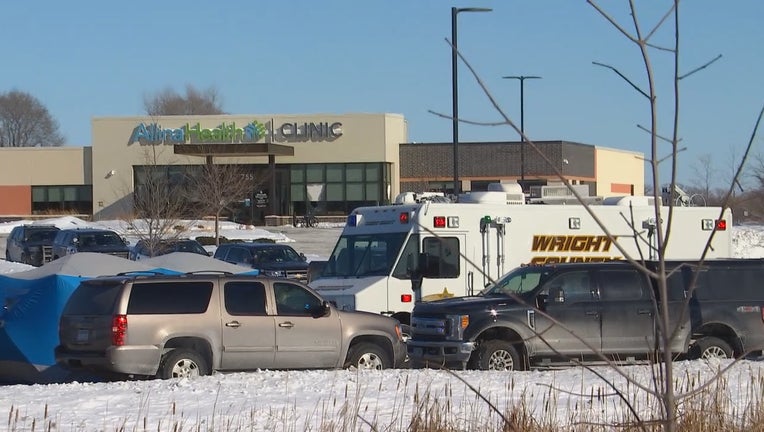Buffalo mass shooting shakes up political debate over police mutual aid costs

Authorities respond to a deadly shooting at the Allina Health clinic in Buffalo, Minnesota. (FOX 9)
ST. PAUL, Minn. (FOX 9) - The mass shooting at a Buffalo health clinic Tuesday quickly became a factor in the state Legislature's debate over the cost of providing police help during an emergency.
Less than 24 hours later, Senate Republicans advanced a bill cutting Minneapolis's funding to repay cities that send officers in during the upcoming trial of Derek Chauvin, the ex-police officer accused of murdering George Floyd in May 2020. State officials expect that security during the trial could cost $35 million, and have struggled to sign up outside agencies to provide officers.

State lawmakers battle over funding for Minneapolis for outside police costs
Senate Republicans forged Wednesday ahead with a plan to cut Minneapolis’s funding to pay for outside police help during the upcoming Derek Chauvin murder trial.
The 3-2 party line vote moved the bill to the full Senate Taxes committee, and a vote on the Senate floor could happen as early as next week. Wednesday's vote came despite the objections of Democrats and Gov. Tim Walz's administration, who noted that Minneapolis Police had sent officers to the Buffalo shooting and were not expecting repayment.
"In my 40 years, I’ve never seen that happen, where the city of Minneapolis or St. Paul has ever asked for reimbursement for responding under mutual aid," said John Harrington, the state's public safety commissioner.
Minneapolis sent 14 people to Buffalo -- 10 members of the bomb squad, three K-9 officers and one public information officer. The personnel were all on duty, and the city will not send a bill to Buffalo, a police spokesman said.
Tuesday's shooting at the Allina Health Clinic in Buffalo left one person dead and four others injured. Local law enforcement agencies from across the metro responded to the scene at midday Tuesday, along with state and federal agents.
Walz has proposed a new $35 million special fund so the state could pay for outside help in Minneapolis during the trials of Chauvin and three other ex-police officers later this year.
But Republicans balked, frustrated that the Minneapolis City Council cut $8 million from the police department's budget in December as the trials loomed. They countered with the proposal requiring Minneapolis to cover the costs of outside police help.
"We should not be rewarding bad behavior," said state Sen. John Jasinski, R-Faribault. "In my opinion, the city council of Minneapolis not funding their police appropriately has caused this issue."
The December budget cuts did not lead to police officer layoffs. But Minneapolis is down 200 officers since 2019, with about 150 of them taking disability leave since the 2020 riots following Floyd's death.
Minneapolis Police Chief Medaria Arradondo told senators that a lack of staffing has made his department "very one-dimensional."
"I’m going to absolutely continue to rely upon other agencies, quite frankly, for assistance until I feel that my police department has the adequate number it needs to continue to serve our community," Arradondo said.
In the House, Democrats have scheduled a floor vote Monday on their $35 million security fund proposal.

